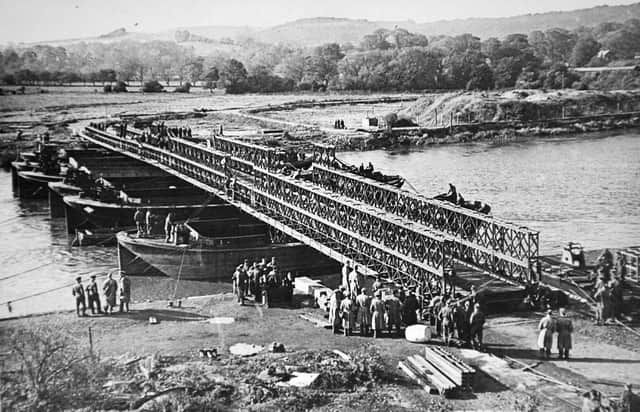Nostalgia with Margaret Watson: Austin’s may no longer have a factory in the town, but there are still many who remember its name and who were proud to work there


Margaret Watson writes: It happened while the presenter, Drew Pritchard, was examining a miniature desk calendar he’d spotted while looking through a number of items in a steel factory in Birmingham, I think.
The inscription on its base, which Drew read out, was “Austins of Dewsbury” – and he commented on how beautiful it was and how skilfully made.
He said it had possibly been given many years ago by a sales representative from Austin’s who was doing business with the firm.
For those who have never watched this programme, it is about antique experts who travel the country looking for items most people have discarded.
Watching Drew, an architectural salvage expert, inspecting this beautiful little calendar and commenting on how skilfully it had been made, brought a lump to my throat because over the years I have written many stories about the firm who made it.
It was called Austin Steelworks, named after the man who founded it over 150 years ago, James Austin, who during his lifetime provided employment for thousands of local men.
It was one of the many Dewsbury industries which sprung to life during the Industrial Revolution bringing great prosperity to the town.
In 1848, Dewsbury was a rapidly expanding town with a population of only 15,000 when the young James Austin, a millwright from Leeds, arrived here hoping to make his fortune,.
He quickly started his own modest business in Watergate, by the River Calder, which eventually grew into one of the largest and most powerful businesses in the district.
James later moved to larger premises in Victoria Road, Springfield, and bought himself a large new house in nearby Springfield Terrace, which he named “Austin Friars”.
He changed his business from millwright to stockist of iron products, and in 1864, moved to another site in New Bridge Street, where Dewsbury covered market now stands.
Soon, little carts bearing the name “James Austin and Sons” were travelling further afield, and the business continued to grow.
They were now taking orders from mills, collieries and factories all over the area, usually for such items as iron plates and sections, chains and a wide variety of engineers’ tools.
Financially, the Austin family were successful, but there was great personal tragedies awaiting them in the years ahead.
By 1870 they were to suffer the loss of two sons within a few months of each other, one while still a baby, and in 1892 James Austin himself was to die aged 69.
Sadly, some years later, two more sons died – James, aged 46, and Cyrus, aged 41, leaving the last remaining son, Harry, left to shoulder the burden of business on his own.
But he was a sick man, and tragically died a few years later aged 45, and being a bachelor, his untimely death severed the line of the Austin’s direct inheritance.
Fortunately there was someone already working within the company who was both willing and able to keep it going, a dynamic young man names Joseph William Wilson.
He knew the steel business inside out and soon had lifted a small but thriving business into one of the leading firms of steel stockholders and structural engineers in the country with contacts all over the world.
In 1927, Austin’s built a new large factory on the site of the old Thornhill Iron and Steel Works in Thornhill Lees, and during the Second World War, they were awarded many government contracts.
Among them was the building of Bailey bridges, used in the D-day Landings, and which played a vital part of the Allied war effort.
They also built RAF hangers, watch towers to give advanced warning of enemy aircraft, and steelwork for the erection of Royal Ordnance factories and blast-proof doors for underground air ministry control centres.
Austin’s contribution to the war effort was considerable and the firm received a wide variety of contracts, serving the country well through the dark days of war.
Sadly, Joseph, who by this time had become Chairman of the Board, died while on a business trip to America in 1947, aged 67.
After his death, Norman Shaw was appointed chairman, and Arthur Wilson, managing director, and later two other men were appointed to serve the company as managing directors, Geoffrey Firth and Roger Firth.
The company continued to acquire large orders throughout the country, including contracts to do most of the major work on the building of Gatwick Airport.
Other contracts undertaken by Austin’s included bus garages for the Yorkshire Woollen District Transport Company, Grimsby Town FC’s new stand, new spinning departments for John Fenton and David Bradley Ltd, and engineering shops for British Ropes.
In the 1980s, Austin’s was taken over by Trumann Steel, of Manchester, and its name was changed to Austin Trumann Steel.
Some years later the Dewsbury Company was closed down and business was transferred to Manchester because the Dewsbury site was not big enough for expansion, but the Manchester site was.
The Managing Director at the time was Keith Sibbald, of Mirfield, who had started with the firm 20 years earlier as a sales director.
Keith was always full of admiration for the way the company developed and prospered over the years.
He became managing director after the takeover at a time when the company was employing 500 people nationally, and the firm continued to grow rapidly.
Austin’s may no longer have a factory in the town, but there are still many living here who remember its name and who were proud to work there.
And, while ever the large house in Springfield Terrace, retains its title ‘Austin Friars’, the name of the Austin family will live on in Dewsbury.
And, there is also a little desk calendar somewhere bearing its name, and maybe someone in Dewsbury bought it, but only Drew Pritchard will know that.